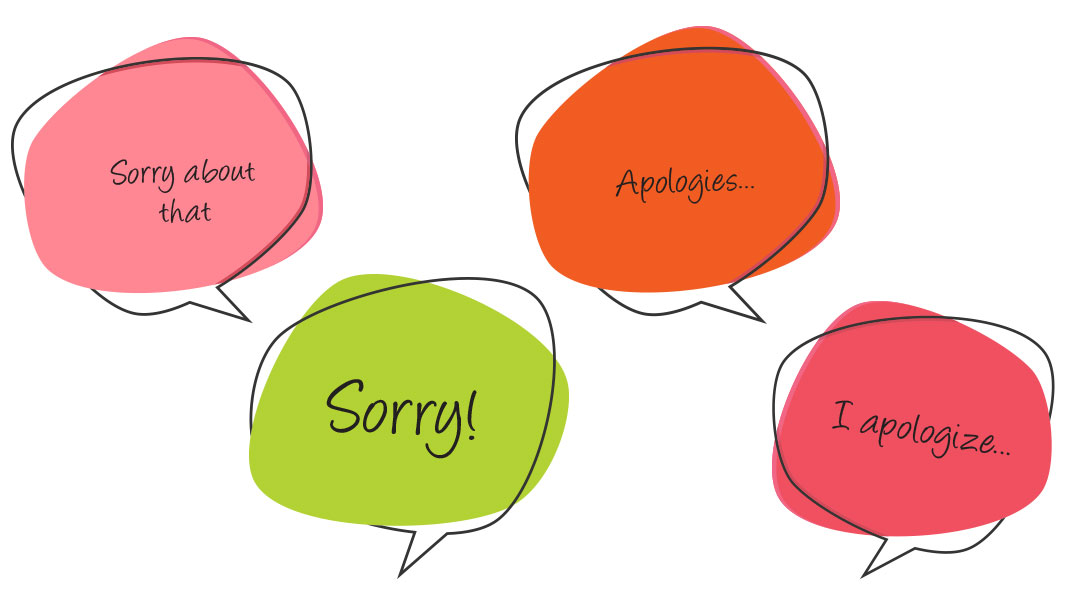Only Apologizing When I Mean It

I apologize constantly. Can I stop?

Hello, my name is Sandwich Generation. I became a grandmother last month! For the full experience, my daughter is recuperating in our home with her newborn, and we even get to make a pidyon haben. For two interesting weeks, we’re lucky enough to have four (!) generations under one not-very-large roof. Also, the kids are always bringing their friends to our house, not to mention that I’m part of four separate carpools.
Though born and bred in New York, I grew up in a home with lots of residual southern politeness — yes ma’ams and no sirs — so maybe that’s why I’m nice to a fault. My friends tell me I apologize for everything, and I guess it makes sense; with so much going on here, there are always going to be toes getting stepped on, both literally and figuratively.
Peacemaker that I am, I have no problem sacrificing my pride to take the blame in order to smooth over some tiff. I could be apologizing all day for things that aren't my fault!
Still, I recognize that it’s not healthy to always be apologizing. For one thing, it lessens the impact of the words when they’re used for everything. Also, I don’t want to be burdened by assuming responsibility for things that are really not my problem. And besides, I don’t want my kids to internalize all that guilt.
The Challenge
Cutting out all apologies simply isn’t happening. To be honest, I wouldn’t even want it to. “I’m sorry” and “excuse me” are social niceties that oil the machinery of interpersonal relationships.
What I do want to do is to be more mindful of when I say “I'm sorry.” I want to reserve the apology for when it’s heartfelt and appropriate, and make sure I’m not assuming culpability for things that aren’t my fault.
I’m setting myself the goal of simply being aware of and noting every time I’m tempted to apologize. Bonus points if I stop myself.
Getting Ready
The one person I tell is my married daughter, who very encouragingly cracks up when she hears what I’m attempting. Whenever she visits, I put out food for her and my son-in-law, invariably apologizing in case it’s not his taste.
With a vote of confidence like that, I’m basically set up for success.
How It Went Down
Monday morning, the day of the pidyon haben, dawns way too early. We’ve got a lot of bleary-eyed people getting dressed in a small space. A never-ending stream of people, mostly pre-teen, are knocking on my door to discuss burning issues related to jewelry, shoes, and sundry accessories.
Finally, in exasperation, I shout, “I’m sorry, I can’t keep answering the door! I need my space for a few minutes!” I catch myself immediately. On reflection, my apology wasn’t for needing my space; it was for losing my cool, and therefore totally warranted.
Post-pidyon haben, I hustle everyone off to school. Before dropping off my son, we head to the supermarket to buy a gift for his secret grab bag. Requirement: the initials NW. Everyone from the cashier through the manager gets in on the fun, racking their brains to find NW items. It turns into a whole little reunion — the manager’s father-in-law had been the Kohein at the pidyon haben.
Eventually, we narrow it down to a Nesquik drink for N, and a globe (world) or wiggle toy for W. The globe doesn’t ring up, though, even after I send my son to go get a different one. The old me would have been apologizing to the cashier, the manager, Ari, anything that stood still long enough, but the new me remembers that this is hardly my fault.
I’m attempting to buy an item offered for sale by their establishment — that’s not something to feel guilty for!
The remainder of the week plays out exactly as I expect — a constant whirlwind of activity. It gives me ample time to differentiate between offering sympathy and apologies. When my daughter Esti needs her fourth ice pack in about five minutes, I make sure to express myself in a way that’s all sympathy, no guilt.
As the week progresses, I also become more attuned to other people’s speech. When I hear my husband admonish a child saying, “I’m sorry, but you can’t...” I notice right away how the apology undermines a perfectly justified limit, and make a mental note not to apologize for legitimate parental communications.
Looking Back
Limiting my apologies was a small exercise that I think will serve me well in the broader scheme of things.
I’m at a stage in life where I simply can’t be everything to everyone. Practicing being unapologetic has helped me make a mental shift from doing every last thing for my children to giving them more responsibility and independence, without feeling guilty about that.
It also made me more aware of my actions in general. When you’re in a place where you need to keep saying, “I’m sorry,” like at a wedding where there’s a lot of jostling, you need to stop and think — why do I need to keep apologizing? Am I being careless? Pushing too aggressively? Why am I in such a rush, and is the way I’m acting in consonance with my values?
Thinking along those lines prompted me to have this conversation with my kids as we headed into a crowded donut shop. I reminded them to move carefully and deliberately, to be sure to make a kiddush Hashem. Sometimes apologies tip you off to an area in which you need to exercise more caution. And sometimes, they’re just baseless Jewish mother's guilt.
Dare role model: I admire women who have the poise to never say anything that they’ll regret. One of my colleagues has an impressive way of offering criticism — it’s sandwiched between so many genuine and beautifully expressed compliments that it doesn’t sting. Those people don’t have to apologize for much.
I would never dare: I can get a lot done. Like many of us, I work full-time with minimal household help. I also often host a lot of guests. Life can get crazy, but I like to think I handle it cheerfully. You should see what I can accomplish in the fifteen minutes before candle-lighting!
Next dare: Getting places on time. Like I said, I can do a lot in a short time, so it’s always tempting to do just one more thing...
(Originally featured in Family First, Issue 680)
Oops! We could not locate your form.













